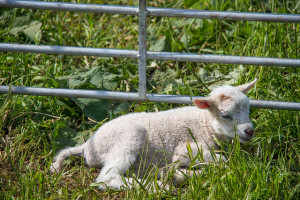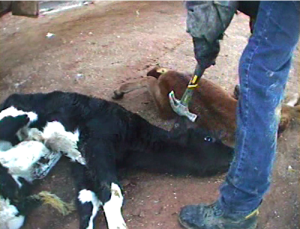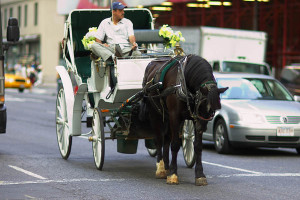by Linda Brink
[The opinions expressed in these essays do not necessarily reflect the position of ARAUNY.]
An activist friend recently put a question out there, which is this: what inspired so many people to become outraged over Cecil the lion’s death, when daily, countless other innocents are routinely abused and destroyed without causing anywhere near the same reactive ire?
My conclusion is complicated, but here goes. With the death of Cecil, a number of human emotions were touched and roused into a response. The fact that he had a name, and therefore was perceived as an individual different from all other lions (who basically look alike to humans) most certainly was a major factor, as many have noted. He also had a story that could be visualized through the many videos of him. In the videos, he appeared as non-threatening to humans, lovably goofy at times, beautifully graceful at others, and always magnificent in his element. On the other hand, Walter Palmer, his killer, came across as a repulsive sleaze, physically creepy to look at, and worse, he lured Cecil out of a safety zone, blasted him with a high beam light and even then, failed to hit the mark.
So, as a hunter, Walter Palmer came across as a despicable egomaniac incompetent with no ethics: an inept, cowardly murderer. And of course, there were many photos of this revolting human gloating over other magnificent fallen prey—slaughtered, people surely assumed, with the same lack of principles. Bottom line, on one hand you have the awesome, mellow animal who exhibited a recognizable personality, and on the other you have the sinister, narcissistic, weird-looking American tooth-puller: innocence vs. evil. People didn’t really know very much about Cecil or Walter Palmer, but they felt as if they did. Also, much of the outrage stems from the methodology of the so-called hunt: Cecil was lured from a safety zone and slaughtered. But even then, the so-called hunter failed, causing the animal to suffer through almost two additional days of agony. So, a lot to be angry and outraged about, all rolled into one disturbing, terribly tragic short story.
When humans identify with an individual animal, when they open their hearts and minds to an animal and care, they evoke all the other human emotions that are tied in with the act of caring. Anger, sorrow, protectiveness, justice. To successfully victimize animals, humans in the business of doing so are always careful to keep
the victims faceless, personalityless—a sea of look-alikes; allegedly dumb, lacking in individual persona, and therefore not at all like peoples’ pets. Humans seem most likely to suddenly open their hearts when they recognize in the animal something they recognize in themselves: a mother protecting her young, an innocent living being obviously needing help while experiencing pain or extreme distress. Cecil was the protector of his clan—but I think what really infuriated people was the luring part. That made the hunter both a coward and contemptible. Plus, the big price tag—this guy literally bought a lion’s head, whether he could shoot or not. Worse, Cecil appeared to view humans as non-threatening; he was a park attraction. People hearing the story did not see him as a predator, but more as a wild pet.
However, don’t ever underestimate the power of the human heart to deny. It’s hardly a leap to grasp Cecil was no different than a lion living outside the park and therefore, one considered fair game for hunting. But even if people don’t consider that, they can surely understand Cecil was no different than any other wild or domestic animal, really—except he was supposedly allowed to live his life in peace. He was no different  than a pig, a steer, a cow, a chicken, a lamb—all living creatures who die by the trillions for human consumption. In all truthfulness, he was no different from me or you: unique spirits all. And yet, I don’t expect that leap to be made by most people, even ardent attackers of Walter Palmer. Connecting the dots when sensing the end result in a situation to be neither convenient nor desired is something humans rarely choose to do. They sort of leave logic hanging, stopping just short of drawing the obvious conclusion. Which is: how different, really, is the meat-eating world community from Walter Palmer? Not very different, after all. People pay to be connected with the product, just as did Walter Palmer–but most will deny this. A head on the wall is different from a muscle on their plates, they will claim–and attack those who point out the hypocrisy as extremists. Fringe-dwelling vegans. Few will honestly accost the fact of their own actions and take responsibility for the gut-wrenching tortures they themselves monetarily support, through product choices and purchase. They will not accept that, by indirect connection, they are complicit in having animal deaths arranged.
than a pig, a steer, a cow, a chicken, a lamb—all living creatures who die by the trillions for human consumption. In all truthfulness, he was no different from me or you: unique spirits all. And yet, I don’t expect that leap to be made by most people, even ardent attackers of Walter Palmer. Connecting the dots when sensing the end result in a situation to be neither convenient nor desired is something humans rarely choose to do. They sort of leave logic hanging, stopping just short of drawing the obvious conclusion. Which is: how different, really, is the meat-eating world community from Walter Palmer? Not very different, after all. People pay to be connected with the product, just as did Walter Palmer–but most will deny this. A head on the wall is different from a muscle on their plates, they will claim–and attack those who point out the hypocrisy as extremists. Fringe-dwelling vegans. Few will honestly accost the fact of their own actions and take responsibility for the gut-wrenching tortures they themselves monetarily support, through product choices and purchase. They will not accept that, by indirect connection, they are complicit in having animal deaths arranged.
Just like Walter Palmer.
The human animal is not really a paradox; rather, our motives are extraordinarily obvious. The path many choose is quite clearly the path of convenience.  Convenience is a powerful word in the realm of human existence. Convenience evokes a certain moral blindness and nurtures a very stubborn resistance to change. Though it’s very hard for vegans to understand why so many—the vast majority—can be outraged over the death of Cecil and then sit down to a pork chop dinner, this phenomenon is quite real. Just as certain trophy hunters claim to be conservationists, so many people claim to be Animal Lovers while deftly refusing to acknowledge the products they stampede to buy are the end result of torture. Indeed, they immensely enjoy the products of unspeakable suffering while not even remotely considering a lifestyle change. And, they defend their choices with undeniable intensity.
Convenience is a powerful word in the realm of human existence. Convenience evokes a certain moral blindness and nurtures a very stubborn resistance to change. Though it’s very hard for vegans to understand why so many—the vast majority—can be outraged over the death of Cecil and then sit down to a pork chop dinner, this phenomenon is quite real. Just as certain trophy hunters claim to be conservationists, so many people claim to be Animal Lovers while deftly refusing to acknowledge the products they stampede to buy are the end result of torture. Indeed, they immensely enjoy the products of unspeakable suffering while not even remotely considering a lifestyle change. And, they defend their choices with undeniable intensity.
 In short: “we have to eat those animals, they’re food.” In discussing this, people don’t envision the faces of the various animal species—innocent, spirit-inhabited eyes looking back at them. Instead, they envision steak on a plate, eggs over easy, ribs hot off the grill. A leather jacket. A fur collar. We have been institutionalized to do this. In these more modern times, even aware of that other Shadowy World, we allow the institutionalization to continue: it’s comfortable. Change is new and therefore, not comfortable—and humans are so fiercely into comfortable. Change requires a learning curve, with unfamiliar parameters to be defined. Why even go there when the screams and blood are so neatly and consistently removed from societal perception? Indeed, AgGag laws represent a very real fear lurking in the minds of the producers. Always, they’ve known a visual connection to the agony of the pork chop could inject a new element into what was a lucrative Stepford Wife existence, because seeing the torture, empathetic people
In short: “we have to eat those animals, they’re food.” In discussing this, people don’t envision the faces of the various animal species—innocent, spirit-inhabited eyes looking back at them. Instead, they envision steak on a plate, eggs over easy, ribs hot off the grill. A leather jacket. A fur collar. We have been institutionalized to do this. In these more modern times, even aware of that other Shadowy World, we allow the institutionalization to continue: it’s comfortable. Change is new and therefore, not comfortable—and humans are so fiercely into comfortable. Change requires a learning curve, with unfamiliar parameters to be defined. Why even go there when the screams and blood are so neatly and consistently removed from societal perception? Indeed, AgGag laws represent a very real fear lurking in the minds of the producers. Always, they’ve known a visual connection to the agony of the pork chop could inject a new element into what was a lucrative Stepford Wife existence, because seeing the torture, empathetic people  feel what producers dread most: a wrenching compassion for the victims. A recognition that they are living individuals, suffering terribly. Indeed, the torture is so extreme, it evokes nightmares in those who witness it, even safe at home sitting at their computers. BigAg truths make people extremely uncomfortable—uncomfortable enough to consider change. No one is more aware of this than BigAg.
feel what producers dread most: a wrenching compassion for the victims. A recognition that they are living individuals, suffering terribly. Indeed, the torture is so extreme, it evokes nightmares in those who witness it, even safe at home sitting at their computers. BigAg truths make people extremely uncomfortable—uncomfortable enough to consider change. No one is more aware of this than BigAg.
 Daily, in America’s greatest urban center, people watch carriage horses clip-clop by on aching feet, in all weather, inhaling grit and carbon monoxide, in fact striding slowly toward their eventual death by slashing, in Mexico—and most do far too little to stop it.
Daily, in America’s greatest urban center, people watch carriage horses clip-clop by on aching feet, in all weather, inhaling grit and carbon monoxide, in fact striding slowly toward their eventual death by slashing, in Mexico—and most do far too little to stop it.
 Achingly confused and fearful, dogs and cats, puppies and kittens, are snuffed out or die from uncontrolled disease in what is not a city shelter but a city concentration camp—and most do far too little to stop it. Animals are not the priority. Jobs, income, party politics, racial unrest, rent control, taxes, the stock market—these are the priorities. Not lives. Animal lives are after all, different. We eat animals. We control them. In the end, they will not fight back successfully and there are proven tactics to control the minority of humans who protest on their behalf. Simply ignoring them is one tactic that’s proven quite successful. Disinformation is another.
Achingly confused and fearful, dogs and cats, puppies and kittens, are snuffed out or die from uncontrolled disease in what is not a city shelter but a city concentration camp—and most do far too little to stop it. Animals are not the priority. Jobs, income, party politics, racial unrest, rent control, taxes, the stock market—these are the priorities. Not lives. Animal lives are after all, different. We eat animals. We control them. In the end, they will not fight back successfully and there are proven tactics to control the minority of humans who protest on their behalf. Simply ignoring them is one tactic that’s proven quite successful. Disinformation is another.
Perhaps without being able to transport their trophies, the adrenaline-junkie pseudo-conservationists will be thwarted. But, we are a violent society. There is a blood lust. Over twenty little children and their caretakers were slaughtered in Newtown—human babies–and after all the outcry, what has changed to prevent that ever happening again? Nothing. And so, massacres continue. Those with power dominate those who have less power. Those with less power refuse to unite and remain dominated. Animals have no power. They only have us—and we are so few and fight each other.
Bottom line, I wish Cecil had not died in vain—ironically, for not much more than human vanity. But that same vanity is indeed part of an accepted lifestyle hypocritical beyond comprehension to logical and empathetic minds. People condemn hunters and lobby to have airlines not ship trophies when everyday, they enjoy products produced from a much more atrocious form of long-term suffering and slaughter and they will continue to choose to do this. Change would require an honesty the majority of human beings simply do not process—denial is so much more the easier path, why think about all that unpleasant stuff at all?
My conclusion? No matter how many lions fall, most people will not significantly change their lifestyle until they have to change. They will not change until there is no other choice but to change. It’s conceivable they won’t change until there are no lions left to fall, until humans find themselves in a place where denial doesn’t make the bad stuff go away anymore. Clearly, this is the direction in which we are moving. Looking straight ahead, we don’t even see the scenery altering around us–and what will happen when finally, it all converges? There will be no reverse gear to take us out of that new wilderness in which so many will surely perish; indeed, most of the planet will have become that wasteland. There will be no miracle cures. There will only be two things—the same two elements that guide everything, everyday: the element of cause, and the element of effect. Ignore them at your peril.
I think a lot of people crying out for Cecil Justice will choose ignorance. But still, yet another baby step has been taken. If nothing else, the trophy junkies may be thwarted. An achievement, that. A very good achievement for the powerless of the planet.
Linda Brink, Director of Sunnyskies Bird and Animal Sanctuary, Warwick, NY



